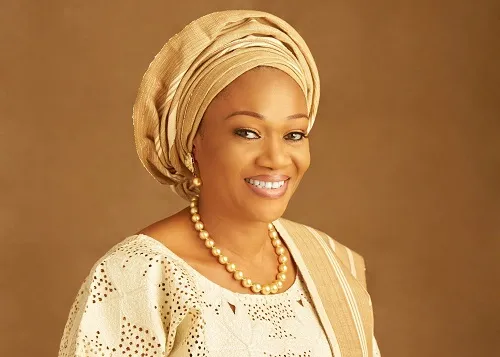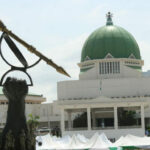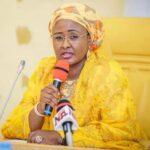Nigeria has come full-cycle with prominent wives of their leaders, breaking from the mold that women traditionally reserved for the wives of political leaders. Within 25 years, the country has generated leaders whose wives have shown resilience, vision, devotion and a mission to impact their fellow women and with luck, on the girl-child.
Three of the five first ladies from the fourth republic have played behind the scene roles as power brokers, initiating individual pet projects as wives of governors before their assumption of the higher status as national first ladies. The other two outside this mold were not outshined. All the projects have targeted the same demographics – women, children and the vulnerable in society. Rather than build on the foundations placed by their predecessors, each woman has couched a personalised project that distinguished their stay in Aso Rock, but tend to fizzle out of limelight once they leave.
One certain thing is that the involvement of these powerful ladies in politics might have a lasting influence on the traditional role of wives and female participation in politics. Only one of the women that influenced politics in Aso Rock has died in office.
Stella Obasanjo – Before he was pardoned and rewarded with the presidency, not little was known about Stella Obasanjo. Born Stella Abebe on November 14, 1945 to the first indigenous chairman of UAC Nigeria, Ms. Abebe enrolled for a Bachelor’s degree in English at the former University of Ife renamed Obafemi Awolowo University. She moved to England where she majored in insurance, but later became a qualified confidential secretary. Some biographers attribute Obasanjo’s decision to anoint Stella as his first lady to her loyalty and unflinching support for her husband during his travails and subsequent incarceration. Her tenacity paid off.
Social Media Savages and Wole Soyinka
How Tinubu’s Appointments raised dust over federal character, others
Stella strode into our political consciousness with her petite frame, her no-nonsense mien, but also her dogged determination to etch her name in our psyche and on the canvass of political history. With the establishment of her pet project, the Child Care Trust, focused on child labour, special needs children and female genital mutilation and located in Bwari on the outskirts of Abuja, she did not live to measure the impact of her project.
Unfortunately, it was her support of child-related issues that would lead to her first and perhaps lasting clash with the media. In May 2005, the publisher of a Lagos-based publication was arrested on the orders of the president. His crime was reporting a story in which the relatives of the late First Lady were said to have been penciled to enjoy preference in the sale of houses slated for auction by government. The backlash generated by that report would overshadow the first lady’s pet project.
It would later be sidetracked when news filtered that she had flown to Spain’s Puerto Banus, Marbella private clinic for a medical procedure that Spanish newspapers would later identify as liposuction. She did not survive the procedure and became the first woman and the first wife of a head of state to die in Aso Rock. To many, Stella would be remembered for her grace, poise and panache. Her fashion style was once described by a social media handle #ogunupdate as ‘peplum’ indicating that it covered the essentials while leaving the rest of the body to imaginations.
Stella’s afro-hairstyle whether left uncovered or partially covered, always complimented her husband’s post-military dedication to local fabrics and traditional wears. Whether adorned in lace materials or in adire (tie and dye) materials, Stella modelled an array of traditional styles that influenced women of her age. Her sudden death silenced this revolution in style.
Turai Yar’adua – Stella’s successor ‘Turai Yar’adua’ contrasted with her. While she was visible politically, Turai was laid-back, both in style and in public view apparently in line with the conservative religio-cultural demeanor of her husband. Hajiya Turai obtained her degree in language from the Ahmadu Bello University, unconsciously establishing a line of first ladies with that background. Like her late husband, Turai was known for her passion for education, starting a career in teaching. Devoted to the plight of the under-privileged she would later champion the quest to make Nigeria self-diagnosing of the scourge of cancer.
She established the International Cancer Center on a rather controversial plot of land at the T-junction of the Abuja-Gwagwalada Road. It was her bid to “stand up to” cancer and its ravaging effects on the nation, she said at the launch of that project.
While not being ‘in-your-face’ with her influence of her husband’s government, it was well rumored that she had her stamp on the selection of certain individuals into her husband’s cabinet. On fashion, Adaora Nwangwu described Turai’s fashion sense as ‘simple’, emphasising that it consisted of “Ankara, a head wrap and a scarf” which was made ‘floral’ draped around her lanky frame. Her brief stint as first lady coupled with her husband’s known ascetism might have robbed Nigeria of a known fashion sense. Not much has been heard of her pet project since the death of her late husband forced her to relocate into relative obscurity in Katsina.
Dame Patience Jonathan – Nigeria’s third post-military first lady, Dame Patience Jonathan was more known for her verbose and often delirious interventions into national discourse than she was known as a fashion icon. Many described Patience, as one of the powers behind the throne. One thing her biographers have showcased above everything else is the fact that she is theoretically Nigeria’s most ‘certificated’ first lady, earning her first, second and doctorate degrees from the University of Port Harcourt.
Her detractors would swear that these chains of degrees in English did not positively impact her oration or the use of the language. She was noted for her flippant massacre of tenses and structure as well as style and linguistics. Like her husband, she could have been the most criticised first lady of the country with many of the attacks focusing on her murder of the English language.
Dr (Mrs) Jonathan was not a first lady to be relegated to the background. She remained one of the most active politicians both in her home state and in Abuja during their six-year stay in the nation’s capital. Her pet project, Women for Change and Initiative with the monicker W4CDI was focused on the restoration of the Nigerian woman, fighting violence and discrimination and raising the status of the girl-child. This project, however, contrasts sharply with her position during the kidnap of the Chibok girls, when she openly debated the truth behind the incident and expressed doubt over its veracity.
Other lofty goals of the initiative were to ensure government’s compliance with a United Nations’ recommendation for 25 per cent presence of women in governance and policy formulation. She received several local and international awards and recognition for her activities as well as several chieftaincy titles. She was not noted for any recognisable fashion creation although she was dainty, clean and decent in her dressing.
Aisha Muhammadu Buhari – From the relative ascetic background of pre-presidential office, Aisha Buhari shot through conservatism and what was thought of as her non-formal education to inform Nigerians that she obtained foreign certificates in beauty therapy and cosmetology from renowned UK and French institutions. She adds to that, a Bachelor of Arts in Public Administration from the Ambrose Alli University in Edo State.
An author in her field of study, Ms. Buhari refused her relegation to political irrelevance that her husband envisaged for her as a wife and forced him to accept the office of a First Lady believed to have been sponsored by non-governmental individuals. Her impact on politics is well documented in her interventions in politics and her husband’s governance style. She became, both a critic and a supporter, tackling the insurgency within the kitchen cabinet and in the larger party and the nation. The record of her encounter with her in-laws pushed her further into the political discourse as her criticism of underperforming ministers and agencies of government.
Mrs. Buhari’s pet project, Future Assured, was meant to tackle the same topical issues that her predecessors had itemised in their projects – to wit – the welfare of children, women and vulnerable groups.
As vocal as she was, her engagement subjected her to criticisms after she was discovered to have ordered the arrest and detention of a social media user who said that the first lady had become chubby since coming into public limelight. Public backlash would force her to ‘pardon’ the offender and instruct the declaration of a nolle prosequi that freed the ‘offender’. Mrs. Buhari spent the last part of her stay outside of Nigeria.
Senator Oluremi Tinubu – Mrs. Tinubu becomes the third Nigerian first lady of the new democratic era who had tasted first-ladyship at the state level. Her husband, like Patience and Turai had been governors of their states before hitting national limelight. In addition to staying in the shadows of her husband’s political career, Mrs. Tinubu is a politician in her own right, having represented Lagos Central Senatorial District at the National Assembly on the platform of the All Progressives’ Congress, APC, three consecutive times. It is a feat she credits to the support from her husband at a time she had wanted to retire and face raising her children.
The 63-year-old mother of three obtained her Bachelor of Science in Education degree from the University of Ife and a National Certificate of Education, NCE in Botany and Zoology from the Adeyemi College of Education. As first lady of Lagos State, Mrs. Tinubu founded the New Era Foundation.
With a sartorial elevation, Remi is the first ‘ordained’ pastor of the Redeemed Christian Church of God, RCCG; a church known for its huge impact on the political landscape, to be first lady. Mrs. Tinubu speaks her mind without compromise, an attribute that sometimes land her in political hot waters such as when she opined that Ibos could not be trusted to keep their words on loyalty to a party not led by one of their own.
Oluremi Tinubu is an Itshekiri woman who was raised in Lagos. Her new pet project is titled the Renewed Hope Initiative, RHI. She conceived it to cater to the needs of women, youths and children. She has identified agriculture, education, economic empowerment and social investment as the key areas. She says funding for her project would come from “unspent funds from the 2023 campaign purse” after which she hoped to source for funds from “private orgnisations, international donors and non-governmental organizations.” She has received a nod from the United Nations, UN.
Mrs. Tinubu is elegant in her dressing, preferring a simplistic fashion that is at the same time noticeably captivating. She appears to showcase the woven aso-oke or ofi in her dressings, but sometimes loosely throws a lacy veil on her dressing as the occasion demands.
With just a year into her husband’s presidency, it is left to imagination, what impact her pet project would have on the polity by the time they complete their first term. For now, Mrs. Tinubu has avoided any political booboo and unnecessary controversy as first lady. In 2023, she celebrated the graduation of the first set of beneficiaries from her RHI project.

 Join Daily Trust WhatsApp Community For Quick Access To News and Happenings Around You.
Join Daily Trust WhatsApp Community For Quick Access To News and Happenings Around You.


